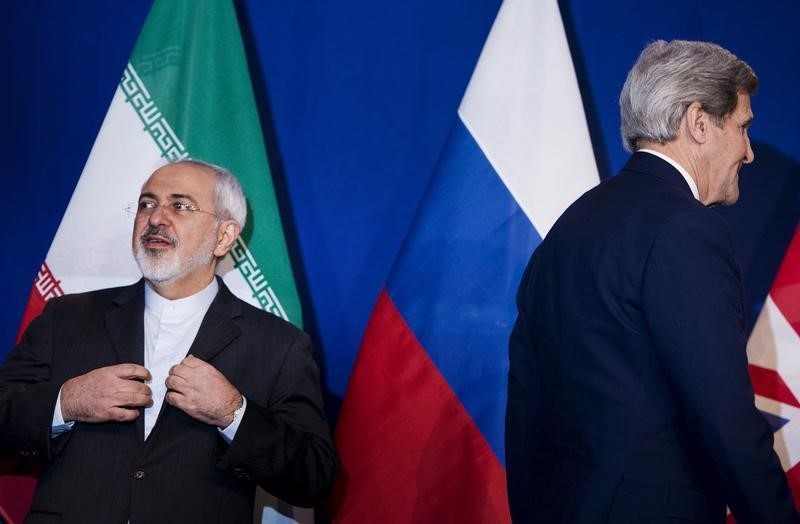By Louis Charbonneau
VIENNA (Reuters) - It's always awkward to defend your enemies. But that's the position U.S. President Barack Obama's administration has found itself in with Iran as it pushes for an historic accord that would end a 12-year nuclear standoff.
Tehran and Washington, which have called each other the "Great Satan" and a member of the "Axis of Evil" during 36 years of hostility, are more used to exchanging insults than defending each other. The two foes cut diplomatic ties after Iranian revolutionaries seized 52 hostages in Tehran's U.S. embassy during the 1979 Islamic Revolution.
Yet for a month now the U.S. State Department has been defending Iran from suggestions that it was on the verge of violating a requirement to reduce its low-enriched uranium stockpile under a 2013 interim nuclear with major powers.
Low-enriched uranium can be further enriched to make fissile material for an atomic bomb, and one of the main goals of any nuclear deal is to restrain Iran's production of it.
Washington has also deflected criticism of continued Iranian violations of U.N. sanctions and reports of attempts to illicitly procure nuclear technology usable in activities the West wants it to suspend.
The Obama administration says it is aware of suspected breaches, but they are not covered under the interim accord, known as the Joint Plan of Action, which was signed in November 2013 and has been extended three times.
"Not defending Iran, defending the JPOA we negotiated with Iran and making clear we've all been in compliance. V(ery) different things," former State Department spokeswoman Marie Harf, now an adviser to Secretary of State John Kerry in the U.S. delegation at the Iran talks tweeted last month.
One senior U.S. official, who spoke to Reuters on condition of anonymity, acknowledged that the U.S. defense of Iranian compliance was "weird" and did not come naturally.
"Iran has done a lot of bad things in Syria and across the Middle East, and still does. It's holding Americans hostages. But the fact is, it's complying with the JPOA."
By "hostages," the official was referring to U.S. citizens detained in Iran, including Washington Post reporter Jason Rezaian, on trial for alleged espionage. The United States says charges against Rezaian and others are false and has demanded their release.
Ali Vaez, an Iran expert at the International Crisis Group, said that the Iranian government has also been criticized by hardline conservatives in Iran for defending the "Great Satan."
"Such are the perils of dealing with the enemy," he said, adding that "the U.S. is not defending Iran, but the deal with Iran."
STOCKPILE TROUBLE
If Iran were shown to have cheated on the JPOA, it would make it more difficult for Obama to sell a long-term accord to lift sanctions on Iran in exchange for curbs on Iranian nuclear work to skeptical lawmakers in the Republican-led Congress.
The Obama administration says a report by the International Atomic Energy Agency last week found that Iran was in compliance with the JPOA, by holding no more low-enriched uranium at the end of June than it had three months before.
But nuclear expert David Albright said Tehran had met the target only by converting some low enriched uranium into a form that could be easily converted back, violating the spirit if not the letter of the agreement.
Albright said the case showed Washington was "prepared to legally reinterpret the deal" to explain away poor performance by Iran.
Olli Heinonen of Harvard University, former deputy head of the IAEA, echoed Albright's caution.
"Any concessions in the implementation of agreed parameters will further reduce the breakout time and erode the credibility of the agreement," he said.
A senior U.S. official dismissed Albright's criticism, saying Iran had done what it was required to do.
WHAT VIOLATIONS?
It was not the first time Washington has defended Iran.
After the IAEA reported that Iran had begun feeding uranium into a single advanced centrifuge last year, which would be a violation of the 2013 deal, U.S. negotiators said it was apparently a mistake on Iran's part and that it had quickly stopped.
A U.N. panel of experts that monitors compliance with Security Council sanctions has repeatedly reported that Iran is suspected of buying equipment linked to the activities it is now negotiating to suspend.
But in its annual report in April, the panel said it had received no formal notifications from U.N. member states of Iranian breaches of sanctions, and suggested this may be because countries were trying to avoid damaging nuclear talks.
The State Department denied that Washington was withholding information about Iranian sanctions violations from the United Nations, and said any such violations were not breaches of the interim deal in any case.
Meanwhile, U.S. officials note that the Obama administration has continued to expand its own blacklist over violations of separate U.S. sanctions, and to condemn Iranian human rights violations.
Karim Sadjadpour, an Iran expert at the Carnegie Endowment for International Peace, said Obama had worked hard in his first term to persuade the world of the dangers of Iran's nuclear program but has since reversed course in order to secure a deal he desperately wants as his second term nears the end.
"In order to reach a deal," he told Reuters. "The administration has had to persuade a skeptical Congress and U.S. public that Iran's nuclear activities are now transparent and peaceful."
